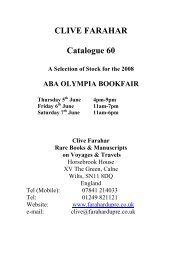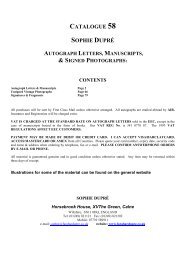You also want an ePaper? Increase the reach of your titles
YUMPU automatically turns print PDFs into web optimized ePapers that Google loves.
Clive Farahar & <strong>Sophie</strong> Dupré, XV The Green, Calne, Wilts, SN1 8DQ, Tel: (01249) 821121 40<br />
301. LIVINGSTONE (David, 1813-1873, Scottish<br />
Missionary & Explorer)<br />
The final four sides of a superb ALS to the Rev. Edwin<br />
SIDNEY (1798-1872), “But after all it is not the false or<br />
even true philosophers whose sympathies well up to all this<br />
world of woe. It is the men in whose hearts the love of<br />
Christ is the controlling motive that feel for all the lost ... of<br />
our race whether at home and abroad ...”, he continues<br />
about his plans to “experiment with the tame buffaloes of<br />
India - they are so like the wild ones of Africa which are not<br />
killed by the poison of the Tsetse that I have sent over 14<br />
which I propose to use as beasts of burden - and if they<br />
withstand the evil effects of the bite of this insect we shall<br />
confer a greater boon on Africa than you will on England<br />
by ... At present no beast of burden exists there. I have also<br />
nine Africans who were recaptured and educated at a<br />
Government school near Bombay. They are all young, have<br />
acquired a knowledge of some trade & are Christians. They<br />
understand that hard work is meant ... I regret that I<br />
neglected to send you a copy of my last work ...” but he will<br />
find it in the Library, “My present attempt is to the North ...<br />
away from all Portuguese ...”, 4 sides 8vo., n.p., n.d. 1866<br />
[SD26570]£2,750<br />
Apparently Unpublished.<br />
Livingstone left London on 13th Aug. 1865 and arrived in<br />
Bombay on 11th September. Here he sold his boat the Lady<br />
Nyassa and invested the money in shares in an Indian bank which<br />
failed a year or two afterwards. He stayed in India until January<br />
1866. Sir Bartle Frere, governor of Bombay, gave him a passage<br />
to Zanzibar in the Thule, a government vessel, which was to be<br />
presented to the sultan of Zanzibar as a gift from the Bombay<br />
government. He had brought with him from India some boys from<br />
the Nassick Mission, and thirteen sepoys, as a nucleus for his<br />
expedition. At Zanzibar he engaged ten Johanna men and four<br />
natives of Nyasaland, and bought camels, buffaloes, mules, and<br />
donkeys to experiment on their resistance to the effect of the tsetse<br />
fly. He arrived off the Rovuma in H.M.S. Penguin on 22nd<br />
March, but owing to difficulties of entering, landed in Mikindani<br />
Bay on 4th April. The animals were overloaded and maltreated by<br />
the sepoys, and bitten by the tsetse fly.<br />
302. LIVINGSTONE (David, 1813-1873, Scottish<br />
Missionary & Explorer)<br />
Fine ALS to the Rev. Edwin SIDNEY (1798-1872),<br />
thanking him for his “kindness in sending me your life of<br />
Lord Hill. Unfortunately however it has not yet come to<br />
hand. I could not call on you for the magnesium wire but it<br />
can easily be got ...” apologising for his late reply as “I was<br />
in labour bringing forth a mouse of a speech at the British<br />
Association here ...” 2 sides 8vo., Bath, 20th September<br />
1864, together with a fine original carte de visite photo<br />
by H. N. King of Bath, showing him seated with his legs<br />
crossed, next to a table with books on it, 4” x 2.5”, laid<br />
down on conjugate blank, n.d., c. 1864 [SD26571]£1,500<br />
Apparently Unpublished.<br />
Livingstone’s Zambesi expedition had ended with his arrival in<br />
England on 23 July 1864. His wife had died of fever during the<br />
trip.<br />
After a week of fêting in London he visited his aged mother and<br />
his children in Scotland. In September he attended the meeting of<br />
the British Association at Bath and read a paper on Africa. He<br />
then went with his daughter Agnes to stay at Newstead Abbey,<br />
where heremained there for eight months writing ‘The Zambesi<br />
and its Tributaries’.<br />
303. LEWIS (C. S., 1898-1963, Writer & Scholar, Author<br />
of ‘The Screwtape Letters’)<br />
Important unpublished ALS (‘C. S. Lewis’) to the poet Alan<br />
Rooke, replying to a dissertation on poetry which Rook has sent<br />
him (typed copy of pages 2 and 3 present), Lewis says that the<br />
letter he is replying to is “the kind I like best ...” and continues to<br />
give his opinions of various poets including Auden and<br />
Wordsworth and his general philosophy on the art of the poet,<br />
“The difference between Banfield and Richards is not<br />
terminological but depends on the difference of their philosophies<br />
which are mutually exclusive. For Banfield the mind is<br />
immaterial and the pleasure is that of transition to new life,<br />
closely analogous on the mental plane to sexual pleasure on the<br />
bodily. For Richard mind means nerves, its pleasures are ...<br />
physiological ...The suggestion that the young ought to<br />
understand modern poetry best was really an argumentum ad<br />
nominem or a calling of the bluff; for I have often heard the<br />
difficulty of this poetry justified on the ground that it was born of,<br />
and dealt with, an entirely new situation which no one over a<br />
certain age could understand. I do not myself accept this ... I<br />
agree that Auden at first showed poetical genius of the highest<br />
order, which has been progressively vitiated by nonsense. This is<br />
one of my chief grievances against modern poetolatry; when we<br />
do get poets we corrupt them ... The attempt to use words in a<br />
purely sensuous or emotive sequence is certainly one cause of the<br />
obscurity ... The private senses are another and quite illegitimate<br />
cause. Often the key to a passage in modern poetry depends on<br />
something which only the poets friends can know ... If this goes<br />
on it will destroy not poetry, but this poetry. Poetry itself, I<br />
trust, will break out again from some unexpected sources ... I<br />
don’t think it can be establishes that the poet has supernormal<br />
‘vision’. Some have this who are not poets - Socrates, St. John of<br />
the Cross ... Some are poets who have it not - Homer, Horace,<br />
Dunbar, Pope, Byron, Housman ...I don’t think Wordsworth<br />
compounded for gold ... I don’t think we know under what<br />
conditions a man loses genius ... the only kind of poetry his talent<br />
enabled him to write wasn’t much good for expressing the view he<br />
now held. My chief suspected disagreement with you might be<br />
expressed by saying ‘you do not sufficiently think of poetry as an<br />
art or skill ... I agree that as prose takes over more and more of the<br />
things once done by verse there will be a likelihood of poet’s<br />
dealing less and less with anything but their own inner<br />
experiences ... I don’t think it is the differentia of the poet that he<br />
is ‘trying to know the unknowable’; that is the differentia of<br />
Man. The failure is Man’s tragedy. [cf Tolkien on Beowulf. The<br />
Monsters & the Critics ... the poet’s only business as poet is to<br />
make poems. Poems about the failure might be quite successful<br />
poems ... I know you are not really a poetolator, but aren’t you<br />
infected in so far as you think of the poet as a special kind of man<br />
instead of a man who can do a special thing ... It all began when<br />
Wordsworth v. foolishly transferred critical attention from the<br />
fruitful enquiry, ‘what kind of art is poetry?’ to the silly enquiry<br />
‘what kind of man is a poet’ - silly, because the only true answer<br />
(a poet is a man who makes poetry) throws one back on the first<br />
question ... If Shakespeare’s late plays are bad, there may be<br />
several simpler reasons than you suggest ...” ending by inviting<br />
him to continue the discussion if he wishes, 4 sides 4to., n.p., 23rd<br />
November 1937, lacking top left hand corner of second sheet<br />
without affecting the text, [SD26072] SOLD<br />
An extraordinary and revealing letter. Unpublished<br />
304. LONGFELLOW (Henry Wadsworth, 1807-1882,<br />
American Poet)<br />
ALS toJoseph Grun in England regretting that he does not<br />
have either “of the autographs you most desire. Insttead I<br />
send you a few others, which perhaps may have some<br />
interest for you ...”, 1 side 8vo, with envelope in another<br />
hand, Cambridge, 28th November 1879 [SD26590]£325





